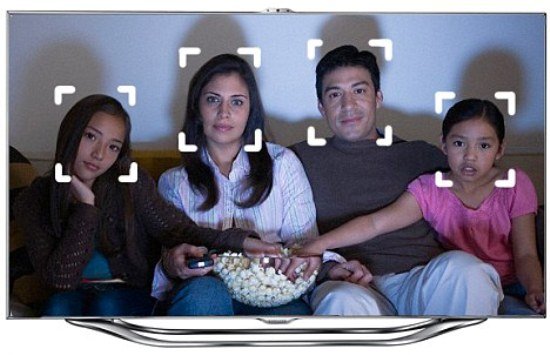
The new generation of HDTV’s and cable receivers sold to the public contain features that are not very publicized by tech companies: Cameras, mics and sensors that have the ability of recording everything that is happening in the living room. Not unlike the telescreens in George Orwell’s novel 1984, TV’s will soon be able to watch and even thoroughly analyze everyone present in the devices’ vicinity.
The cable company Verizon has recently filed a patent for a system that contain audio and video sensors coupled with facial and profile recognition software. That would allow the company to obtain information such as the number people in the room, their sex, their race, what they are doing and even what they are consuming while watching TV. The goal of such a system is to broadcast “targeted advertising” but crossing the line to outright spying on people is only footstep away. Here’s an article on Verizon’s patent.
Verizon Files Patent for Creepy Device To Watch You While You Watch TV
Picture this: You’re having an argument with your partner while watching television, and suddenly an advertisement comes on for marriage counseling. Or maybe you’re doing some weightlifting while a movie plays in the background, and ads for health food pop up on the screen.In the past, it would have been mere coincidence. But in the future, things look set to change, thanks to Verizon’s “gesture recognition technology.”The company has filed a patent, published last week, for a system designed to be used in the home to target advertisements at people. Using a combination of image and audio sensors, it would detect actions in your living room while you were watching TV. These sensors, deploying facial and profile recognition, would pick up “physical attributes” like skin color, facial features, and even hair length, and also detect “voice attributes” to help determine the tone of your voice, your accent, and the language you speak. Inanimate objects aren’t off-limits—the technology could also spot beer cans and wall art.Combined, this would mean that your TV or set-top box would effectively be watching and listening to you while you snuggle up on the couch with your partner to watch the latest episode of Homeland. If the cuddling went a bit further, the chances are the technology would pick up the noises and start playing ads for “a commercial for a contraceptive” or “a commercial for flowers,” as outlined in the patent.The patent also says if the device picks up that the user is “stressed” then it “may select an advertisement associated with the detected mood (e.g., a commercial for a stress-relief product such as aromatherapy candles, a vacation resort, etc.).” It adds that “If a couple is arguing/fighting with each other” the system “may select an advertisement associated marriage/relationship counseling.” And if the sensors detect that a user is a kid, the system will trigger “more advertisements targeted to and/or appropriate for young children.”
As Steve Donohue at FieceCable has noted, Verizon’s technology would operate in the same way Google targets Gmail users based on the content of their emails—only transposing that principle into the home by “scanning conversations of viewers that are within a ‘detection zone’ near their TV, including telephone conversations.” Of course, this is only a patent, so you don’t have to start eyeing your TV suspiciously—for now. ArsTechnica points out similar patents have been filed before and have yet to be put into practice. But that doesn’t make this latest incarnation any less creepy—and is perhaps an illustration of how surveillance-style technologies are increasingly encroaching on private life.http://vigilantcitizen.com/
- Source: Slate

No comments:
Post a Comment